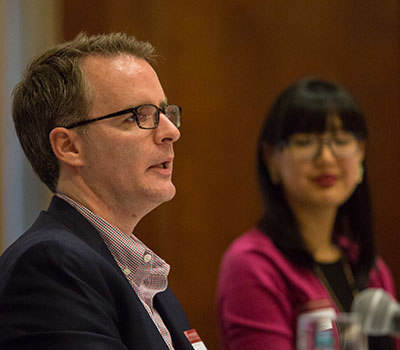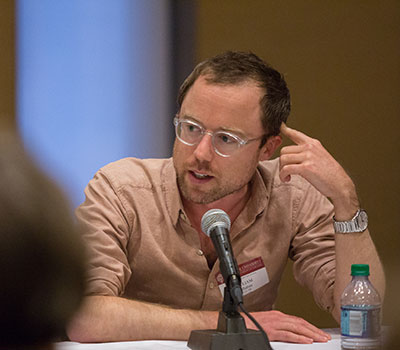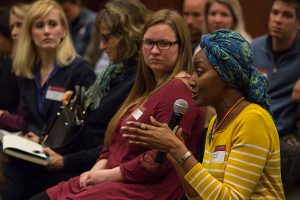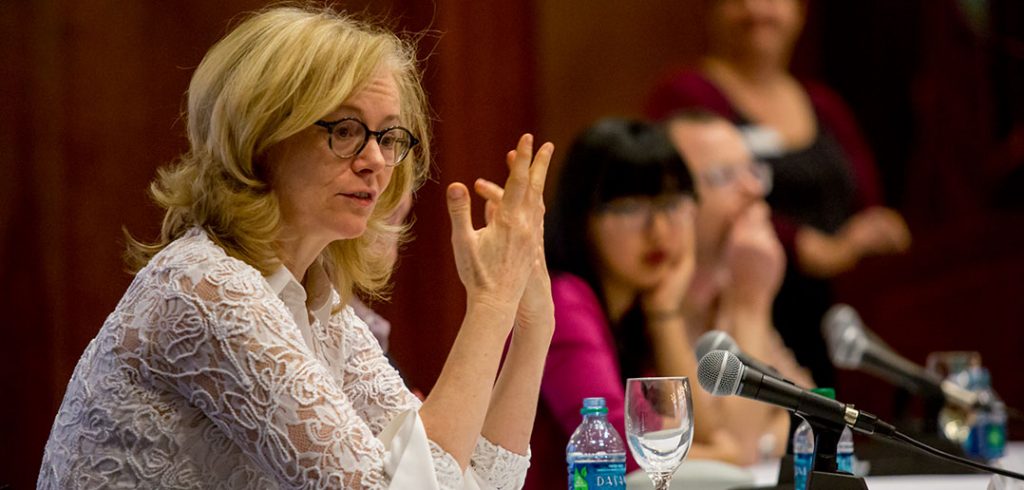For bestselling author Mary Bly, a professor of English at Fordham, that kind of openness to ideas and innovations is the key for anyone hoping to join the rapidly changing field.
Looking out on a Manhattan sunset from the 12th-Floor Lounge in Fordham’s Lowenstein Center, Bly spoke on a panel with three industry professionals about starting points for a career in publishing, and for getting writing into the world. The Office of Alumni Relations hosted the April 5 event as a career workshop for students and recent graduates.
Bly, a popular romance novelist under the pen name Eloisa James, recalled the drive that pushed her to get her first books out and the shrewd moves that keep them atop the charts.
Her career had a financial impetus. She needed to pay off student debt after earning degrees at Harvard, Oxford, and Yale, and beginning an academic career. She also wanted security for her growing family. So she sought out the elements that make a book shine for both popular audiences and editorial gatekeepers.
“I got five bestsellers written by two New York Times bestselling authors, and I spliced those books to find out why I thought they were selling,” she said. Her plan worked: Her first manuscript advance was $2,000 more than the balance on her loans.
To keep her momentum, Bly thinks strategically about what makes a book sell. “I don’t believe in writing the book of your heart,” she said; she prefers to consider what will keep editors interested and audiences engaged. “Figure out what’s going to sell and make that the book of your heart.”
Joining and Shaping Cultural Conversations
In Bly’s case, one reason she is the favorite of both reviewers and romance readers at large could be the depth she sees in the genre—a quality often overlooked by literary critics. She mentioned that issues of consent have long been at the center of top romance books, which is one reason the women-driven narratives command vast female readerships.
“Romance, like all genres, might seem like it’s self-contained, but in fact it’s incredibly porous and it reflects what’s going on in culture now,” she said. Successful writers must understand what they would contribute to the larger cultural conversation, and what readers most have on their minds.
But to get work noticed in the first place, writers must find outlets that will take a chance. “Agents and editors, we’re reading everything,” said Miles Doyle, FCRH ’01, a senior editor at HarperOne who specializes in religion, spirituality, and health and wellness, with particular interest in alternative self-help.

The panelists encouraged writers to familiarize themselves not just with the classics but with the books and writers that are rising now. “You need to be reading all the time,” said Bly, urging writers to make note of passages that move them.
Finding a Community
Newcomers can also create networks. “They help each other find readings, and they buy each other books when they’re young,” said InkWell Management editor and agent William Callahan, FCLC ’08.
Both Callahan and Doyle mentioned gatherings like the Catapult writing workshop and Brooklyn’s Franklin Park Reading Series as ways for aspiring writers to meet promising peers, and find outlets or agents to represent them. “There is such a thing as the literary community,” Callahan said. “Try to get in there.”

The panelists’ advice extended beyond writers, and each offered suggestions for the many aspiring publishers, agents, and publicists in the audience. Those interested in publishing will find that some flexibility in the subject matter and types of jobs they start out in can improve the chance of real job prospects. The panelists also stressed that location is a major factor in getting that first job. “You’ll be doing a lot of unexpected things, so like the unexpected,” said Callahan. “Make the real advantage of living in New York City work for you.”
For the students and recent Fordham graduates in the audience, this was a chance to network with professionals who were once in their place and to reconnect with Bly, who eagerly forged connections between panelists and former students during a reception after the panel discussion.

Tatiana Ridley, FCRH ’05, and Erika Ortiz, a Fordham College at Lincoln Center senior, both found the event helpful. Ridley, a nutritionist and yoga teacher said she hopes to publish a book about holistic healthcare based on her wellness brand, Healthylicious Bliss, and a children’s book about her childhood pet rat, Tommy Lee.
Ortiz said the event gave her the boost she needed after spring break; the creative writing major, who is set to graduate in May, is interested in both sides of the publishing world. “It was very relevant, and very important,” she said.
To Doyle, success in publishing is ultimately about developing one’s taste in writing—something that starts in the classroom. “Fordham refined my tastes,” he said. “It made me a better writer, and a better reader.”
—Violet Baron

